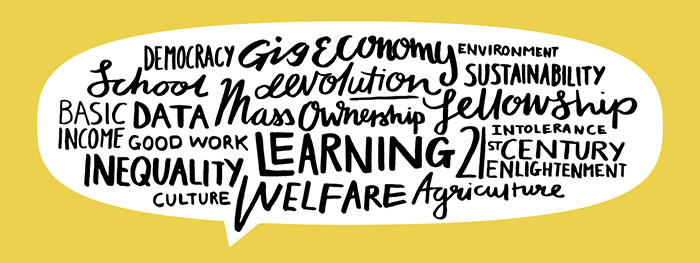Thinking big is necessary. Ahead of a major series of events at the RSA discussing some of the key challenges our society faces in the 21st century, Matthew Taylor asks why our democracy fails the test of government of the people, by the people.
As Donald Trump continues his attacks on the free press, as the Polish Government sponsors a national demonstration bringing together nationalists with neo-fascists, as we watch nervously to see how the authoritarianism of the new Brazilian president will become manifest; it is reasonable to be defensive about liberal democracy. After all, these current events are part of a larger pattern of public disenchantment and illiberal populist mobilisation.
Many see the roots of this unfolding crisis in the economic system and the impact of both the intended and the unintended consequences of globalisation. They seek a political response in terms of new visions, narratives and policies. Thinking big is necessary. Through our research, our ideas platform and the work of our Fellows the RSA is exploring the dimensions of what we have referred to as 21st Century Enlightenment. To mark the opening of our new amazing space in John Adam Street we are over the next few weeks holding major events and launching important essays addressing some of these questions.
Join the conversation (19th November - 10th December): a series of powerful conversations looking at the change needed in our democracy, education and economy
But we also believe, as I have written in recent posts, that the defence of liberal democracy should involve acknowledging the failings of our existing democratic processes and institutions. In other words, it’s not just about the outcomes of the political game, what is decided and who wins but also the fitness for purpose of the rules by which the game is played.
I have made the case for the greater use of deliberative methods in earlier posts and in my annual lecture but reading ‘Democracy when people are thinking’ by the doyen of deliberation, Stanford Professor James Fishkin (speaking here at the RSA in a couple of weeks) has made me want to go back a stage in the argument. Experience has taught me that political impact is less about winning support for solutions and more about defining the problem. So, while it is well trodden territory it is worth reminding ourselves of some of the most glaring reasons why a representative democratic system like ours is flawed:
Ignorance and bias: Most voters simply do not know enough to make an informed decision about most policy areas. This may sound like elitism, but the evidence is clear. No one with the average knowledge of a voter would be taken seriously in a policy making conversation in government or a research organisation. Voters are also influenced by a whole range of factors, from the looks and personal life of the candidate to the effectiveness of campaigns, which are not relevant to making the right decision. While voters have better access to information and are becoming better educated, these gains are probably more than cancelled out by our susceptibility to a rising tide of sophisticated and targeted Fake News.
Manipulation: Elected representatives are open to substantial manipulation. Whether it is opinionated parts of the media, vested interest, lobbying companies or Party donors, MPs systematically give more weight to some opinions than others with the views of their electors (even if those views are known) often generally low down the list.
Representation: Our representatives are not representative of the country in terms of ethnicity, gender and, particularly, class. MPs have strange lives and, despite the tireless social work most of them do in their constituencies, they see the world at an angle. Also, if they have any ambition MPs will need continuously to respond to the unrepresentative views of their Party masters and activists.
Mandate: UK governments are generally elected by little more than a third of eligible voters and sometimes quite a lot less. Voters vote on a whole package not specific policy and, anyway, most Government decisions result from changing events not what a Party said in its manifesto. Once a government is formed the power over decisions rests overwhelmingly with the Executive with representatives outside the executive, let alone in the opposition, having little or no influence.
There are various responses to these critiques. For example, it is said that while voting may not be influenced strongly by awareness of the issues, it is by peer group effects, meaning that voters take their lead from people who aware. But, at best, these qualifications only detract slightly from the underlying picture of a democracy that in many ways fails the test of government of the people, by the people, for the people.
The criticisms are well-known to democracy experts and privately acknowledged by politicians. They are rarely stated as to do so would risk the debate-ending charge of arrogance and elitism. Indeed, a skilful tactic of the Brexit camp has been to bait their opponents into implying that any Leave voter was anything other than fully au fait with the details of EU membership and departure. But, however obvious to the experts and however objectional to rabble-rousers, we need to a lot more people to ask the question; given its profound limitations is it any wonder our democratic system is both ineffective and unpopular?
By contrast deliberative democratic methods (sometimes referred to as ‘mini-publics’) provide participants with information and access to a range of opinions, closely replicate the make-up of the population at large, enable people to make choices based on the merits of each case, challenge and guide executive decision makers and leave participants feeling not only better informed but more respectful of both policy complexity and the views of other people.
Grand theory and ideological renewal may be exciting but the debate about liberal democracy must also be about the basics. Otherwise we are football pundits trying to explain why our team keeps losing without noticing our players are wearing lead weights on their ankles.
Unless we make deliberation a central part of how our democracy works I see no realistic way to renew public faith in the system. That’s why, next year, the RSA will be a leading partner in a campaign for deliberative democracy. Join us!
Related articles
-
Why Theresa May should reach for her inner Pankhurst: time for a National Citizens’ Jury on Brexit
Ed Cox
Ed Cox argues why we need a National Citizen's Jury on Brexit.
-
Our call for action on deliberative democracy
Ed Cox
This week the RSA, working in partnership with Involve, has issued a call for action on deliberative democracy. The call comes during National Democracy Week and in conjunction with the RSA’s Chief Executive’s Lecture entitled What Democracy Needs Now.
-
Read about it here – you won’t anywhere else
Matthew Taylor
Matthew Taylor reflects on his twelfth Chief Executive Annual Lecture as the RSA launches a campaign for deliberative democracy with Involve





Join the discussion
Comments
Please login to post a comment or reply
Don't have an account? Click here to register.
Your case for deliberative democracy avoids the nub of the matter, viz. a structured process (define the problem) which reveals the elements of the issue under review and, by way of a universally understandable ‘language’, make the views of each participant transparent and thus the whole selection process itself (public accountability, tick); sunshine is the best disinfectant. Above all, the process must always make the best choice (NOT the right choice - it doesn't exist, who is to judge?), on any subject, and for any number of participants (unity and commitment, tick).
Moreover, such a process has to be freely available, on a website which eschews commercial influences to ensure it is beyond reproach. Engagement and empowerment, tick.
An App “Informed Choice – ic!” addresses all the foregoing and should offer the prospect of renewing public faith in the system. This process applies to any walk of life, in any forum and has been proclaimed by Professors of Decision Theory as "ingeniously simple". It focuses on the issues, not distorting emotive 'noise'. Indeed, transparency as an all-pervading, yet benign governor is perhaps a beacon the RSA should promote? 21st Century Enlightenment?
From Piet Hein:
MAJORITY RULE
His party was the Brotherhood of Brothers,
and there were more of them than of the others.
That is, they constituted that minority
which formed the greater part of the majority.
Within the party, he was of the faction
that was supported by the greater fraction.
And in each group, within each group, he sought
the group that could command the most support.
The final group had finally elected
a triumvirate whom they all respected.
Now, of these three, two had final word,
because the two could overrule the third.
One of these two was relatively weak,
so one alone stood at the final peak.
He was: THE GREATER NUMBER of the pair
which formed the most part of the three that were
elected by the most of those whose boast
it was to represent the most of the most
of most of most of the entire state --
or of the most of it at any rate.
He never gave himself a moment's slumber
but sought the welfare of the greater number.
And all people, everywhere they went,
knew to their cost exactly what it meant
to be dictated to by the majority.
But that meant nothing, -- they were the minority.